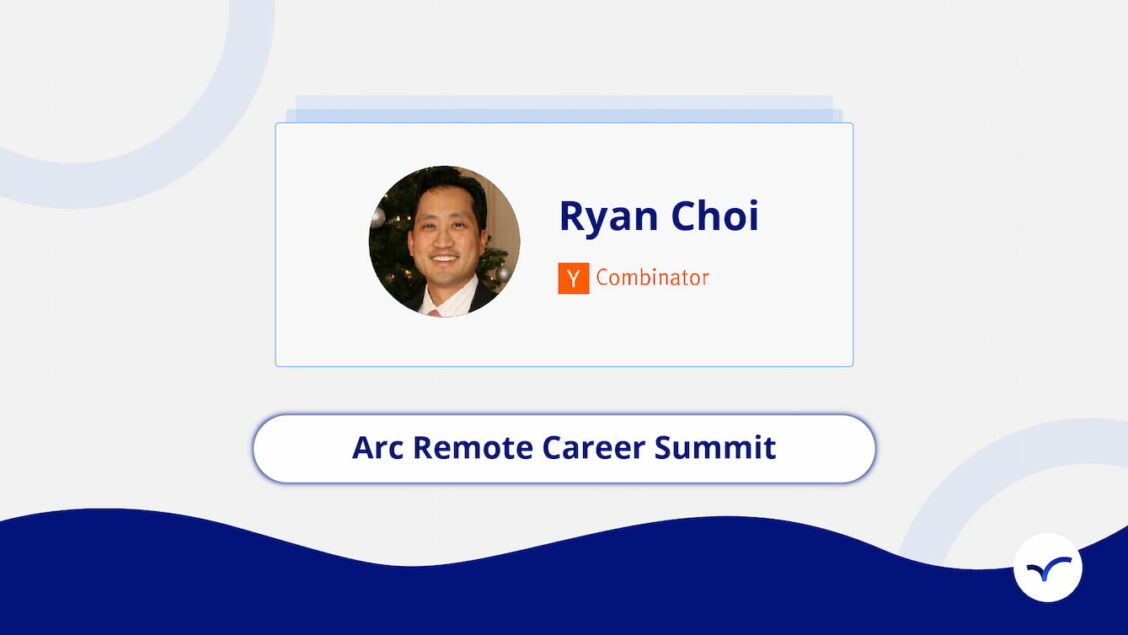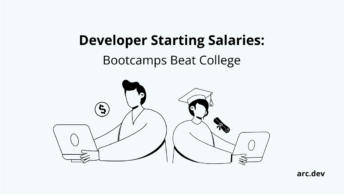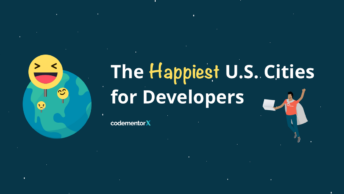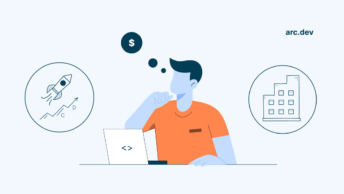Thinking of working at a startup, becoming an engineer, but not sure where to start? What should be in your resume? Is it okay to contact a founder directly?
Y Combinator’s Ryan Choi is an expert at answering these questions, as he helps connect job-seeking software engineers with startups via workatastartup.com.
He (virtually) swung past the Arc Remote Career Summit 2020 to share his insights into why a startup might be a good fit for your next engineering job — and, just as importantly, why it might not. In fact, some of the day’s attendees thought it was the “best talk of the day!”
Curious?
Watch the video below, or read on to find out more.
Looking to hire the best remote developers? Explore HireAI to see how you can:
⚡️ Get instant candidate matches without searching
⚡️ Identify top applicants from our network of 300,000+ devs with no manual screening
⚡️ Hire 4x faster with vetted candidates (qualified and interview-ready)
Try HireAI and hire top developers now →
Major Advantages Of Working At A Startup
Here at Arc, we’re pretty into startups — after all, we are one! So Ryan’s list of major advantages to working at startups didn’t come as much of a surprise 😉 But if you’re new to the world of startups, check out the three main advantages of working there below.
Learn from Great Founders
Whatever skills you’re bringing with you when you walk through the door at a startup, you’re still going to learn more. The chance to work directly with the founders themselves is one of the key advantages — as Ryan says, it’s the chance to learn best practices from experts.
Despite first appearances, often founders are serial founders, and bring with them prior experience!
Opportunities
Learning opportunities are everywhere at startups… and not just on the professional front. Both professional and personal — including ones you might not even be qualified for! Ryan shared his experience of being sent to China to build, run, and scale a team in 2008, which was an opportunity that opened to him due to his work.
Read More: Where to Find Remote Junior Developer Jobs & Engineering Intern Roles
Ownership and Impact
When the team’s small, your responsibilities are great. On the flip side, your personal impact can also be huge. At a startup, the team is lean, and each person can own part of a project, talk to customers, figure out what they want, and what needs to be built to support that.
Especially at smaller companies, you can have a big impact: you get to contribute to building the foundations of both the product and the company itself.
Reflecting on his experiences, Ryan said:
To have that level of ownership and craftsmanship, building a thing with a small team was something that I couldn’t have gotten at other large companies that early in my career.
The Differences Between Startups and Large Companies
It goes without saying that a small startup and a large corporation are at very different points in their business journeys. As such, the two types of businesses are looking for different things in their team members, and provide a different working experience. Ryan listed out a number of these:
- Startups tend to look for generalists (who are open to doing lots of things, and quick to learn), whereas larger companies tend to look for specialists
- At smaller companies, you can have access to customers (especially good for aspiring product engineers!), which may not be possible at a larger company/more restrictive role
- Job ownership is higher at smaller companies (but the amount of impact you can have in a role can depend, e.g. at FAANG companies, a smaller piece of work like a settings change might have a very big impact on a lot of people)
- Opportunities to try new things is easier at startups — get asked to find solutions to random things that pop up (but that said, there may be more opportunities for lateral movement at a bigger company)
- Compensation is generally lower at startups than larger companies (Ryan advises startups not to hire “mercenaries” who are only after a high paycheque, but advises job-seekers that compensation will generally level out with the wider market by the Series B or C funding round)
As Ryan told us:
If you want to be very product centric — solving problems, talking to customers — startups are a great place to learn that skill.
Read More: 5 Great Ways to Get Your Profile Noticed as a Software Engineer
How to Choose Between a Startup and a Large Company: Ask Yourself “What Matters to Me?”
Ryan listed out a number of questions that you should ask yourself if you’re trying to choose between working at a startup or a larger company. Check these out below:
- What is your appetite for risk? (Take into account the startup’s financial position, too!)
- Are you inspired to solve the problems that the startup has?
- How hard are you willing to work?
- Is mastery or craftsmanship important to you? Will this startup provide these opportunities (e.g., providing technical or scaling problems)?
- Does the startup have interesting technology?
- Is the learning opportunity vs paycheck ratio right for you?
He also noted that more and more startup jobs are remote-only or remote-friendly: now over 50% of the roles available on workatastartup.com!
What to Put in Your Engineering Resume
Want to get hired? Make the hiring manager’s job as easy as possible by showing your previous results!
Ryan suggests optimizing your resume for the following types of prior work experience:
- What did you work on? What product/thing did you help ship?
- How did you get your work done? What tools and technical skills did you use? What libraries and programming languages did you use? Talk about your former experiences working on teams, including how you worked together.
- What impact did you have? (Ryan says this is particularly important for product engineers — it shows your head is in the right space for a startup!)
As he told us, getting this right is important “because it’s telling a story about what you’ve done in the past and why you might be a fit for what you’re applying for.”
Ryan also gave some tips for new engineers who need to rely mostly on bootcamp experience:
- Add things to your resume that show what you can ship. Link a GitHub profile, portfolio, or other things that you have actually built.
- Create a Heroku account and ship something there so people can look at the craftsmanship.
- If you’re linking to a project in your resume, make sure that there is actually something at the end of the link! A dead link leaves a poor impression.
- Create a tailored two-sentence byline about what you do and why you’re excited about that startup.
Read More: 12 Common Mistakes Keeping You From Landing Your First Developer Job
Reach Out to Founders
Now that you’ve pulled together a great resume, it’s time to start searching online for an available job opening. Or is it? According to Ryan, not necessarily:
So resumes are an important thing. It’s only one part of the picture though, right? So when
you reach out, don’t just apply. You should contact the founders.
Ryan pointed out that one of the unique features of working for an early-stage startup is that it’s often possible to discuss opportunities directly with the founders themselves. Whether that’s reaching out to propose an opportunity, or following up on a submitted application, many founders often make their contact details available to job-seekers.
However, Ryan cautioned that personalization matters. He suggests that you should provide insight or value to the founder when you get in contact, e.g. listing some potential improvements to their product. You should also, e.g., use the product (if possible) and contribute to the product’s community. This shows that you’re actively thinking about, and interested in, what the founder is building!
Read More: How to REALLY Get a Job as a Self-Taught Developer
Ask Questions About The Startup
You’ve landed an interview with a startup?
Congratulations!
Of course, interviewing is a two-way process, so you also need to have questions prepared to ask the team. Be sensible with the timing of asking these — as Ryan pointed out, these questions will generally be better received towards the end of the hiring process.
Some questions to consider asking include:
- What is your runway and burn rate? (This will help you decide your risk tolerance.)
- Why will you win when others have failed? (Use this question to get insight into how the founders think.)
- How do you think about testing/test automation? (Get insight into the product: quality balance in terms of time invested.)
- How do I evaluate my stock options? (This is part of a transparent and trust-building discussion from the startup’s perspective.)
- Do I want to be an expert in X? (Consider whether the opportunity provided by the startup, and the expertise you will gain in its product, tool, team, etc. is what you actually want.)
Read More: How to Write a Great Thank-You Email After an Interview
5 Things to Expect When Working at a Startup
Ryan also listed out things to expect when working at a startup, because it may be different from a more traditional role. Having realistic expectations is important!
According to Ryan, while working at a startup, you can expect the following:
- Be prepared to work hard (including, possibly, longer hours).
- Be comfortable with change. (As Ryan told us: if you need a long-term, clear roadmap, startups might not be a good fit for you.)
- Learn the business behind your product.
- Learn from everyone: founders, coworkers, customers, partners.
- Learn to start a startup (Ryan pointed out that a lot of interns and team members at startups go on to become a founder themselves!).
Read More: How to Negotiate Your Salary as a Remote Developer
Thanks Ryan for all your great tips on working at a startup — including how to land a job at one. For those seeking tailored resume advice, Ryan said he is happy to provide resume reviews via ryan@ycombinator.com
Any other thoughts? Let us know in the comments below.
You can also explore HireAI to skip the line and:
⚡️ Get instant candidate matches without searching
⚡️ Identify top applicants from our network of 250,000+ devs with no manual screening
⚡️ Hire 4x faster with vetted candidates (qualified and interview-ready)








